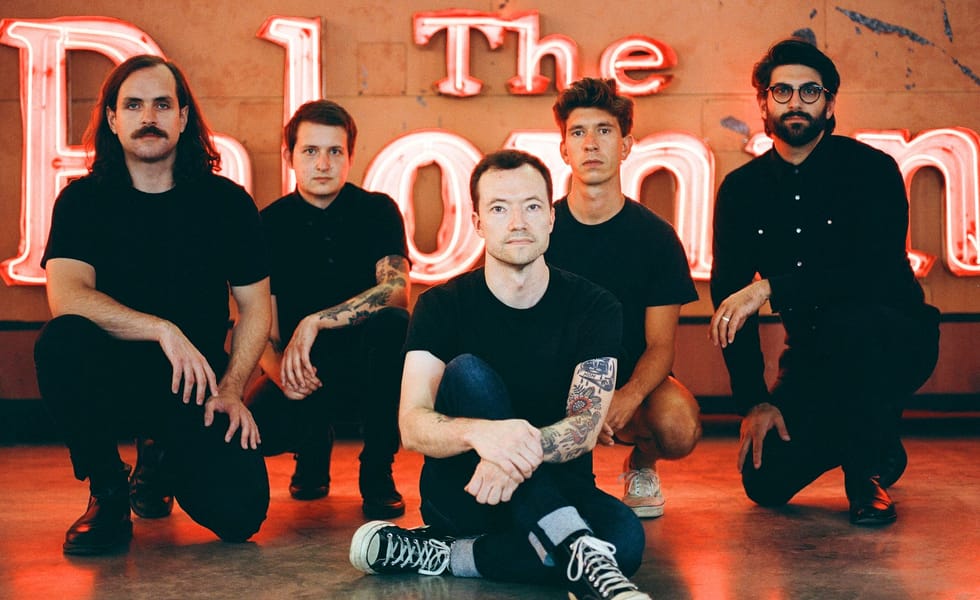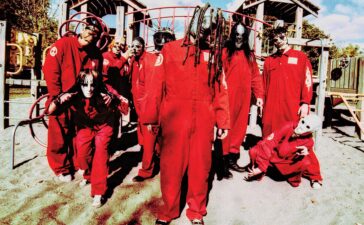In our newest column, Opening Up sees us talk to musicians about the opening track from each of their studio albums. First cab off the rank is Jeremy Bolm, the lead vocalist of LA skramz titans Touché Amoré.
The band put out their fifth studio album Lament last Friday, which seemed as opportune a time as ever to talk through each of their distinctive, career-defining track ones across their decade-plus discography.
Jeremy Bolm is a record collector, in the most traditional sense of the term. It’s not enough to own the record on vinyl – if he loves it enough, he’ll get the different colours, the Japanese edition with a bonus track and a deluxe reissue. Bolm has a room in his Los Angeles home – which he shares with his fiancée, their cat and their dog – dedicated solely to his records. He’ll frequently show them off to his 33,000 Instagram followers too – not to mention on Discogs, where he’s somewhat of a kingpin.
Even with all of this in mind, however, he initially draws a blank when queried on what makes a great album opener. “That’s a really tough question,” he says with a nervous laugh. “Different things work for different albums. As far as hardcore albums go, I’m pretty over the instrumental intro track. I think that one’s really been done to death.”
After a brief moment of thought, Bolm points to ‘If It Bleeds It Leads’, the 28-second opener to Since By Man’s 2002 debut We Sing The Body Electric. “They were frowned upon at the time, but the way they did things was really, really cool,” says Bolm. Bolm also brings up ‘Composite’, the opening number from End Of A Year’s third album, You Are Beneath Me.
He points to it as a memorable introduction, given it was the first time he had heard the band that would go on to be known as Self Defense Family – not to mention a band that Touché would be labelmates with for a time, too. “Basically, it’s Pat [Kindlon, vocalist] telling you everything you need to do in order to enjoy the album,” he says.
“As it goes on, drums pick up behind him and he turns it into a list of rules for life. It’s really enjoyable. I like a record starting in your face like that. I think being clever, being different and setting the tone for what’s to come are all traits I look for in starting a record.”
‘And Now It’s Happening in Mine’ – …To the Beat of a Dead Horse (2009)
Clap-clap, clap-clap-clap, clap-clap-clap, clap-clap. The first noise that Bolm makes on Touché Amoré’s debut album is not a scream, a shout or even singing. It’s a syncopated hand-clap, which mimics the song’s triplet rhythms – and, in turn, creates easily their most recognisable intro out of all five of their records.
“We were really drawn to the screamo scene of the mid-to-late ’90s,” says Bolm when queried on its inspiration. “Bands like pg.99 and Orchid actually had a lot of clapping parts in their songs. We were also really inspired by a band from here on the West Coast, Comadre. Their first record in particular had lots of claps too – they were really fun. This was a band that didn’t play on stages, that played shows that felt really inclusive. It felt right to just do that.” To create a sense of contrast, Bolm’s hand-claps are juxtaposed with a wail of guitar feedback – prompted simply from plugging the guitar in. “I was really into this Long Island hardcore band called Vision of Disorder,” he says. “One of the tracks on their album Imprint starts with that plug-in sound – it always gave me such a buzz when it hit. I pretty much just stole the idea from that.” Bolm plays the opening moments of Imprint down the phone-line just to prove his point. “It’s the ultimate ‘oh shit’ moment,” he laughs.
Of course, it’s impossible to talk about the song without addressing its elephant in the room: its title stems from a lyric from The Smiths’ ‘That Joke Isn’t Funny Anymore,; and lead singer Morrissey is referenced in the song’s lyrics. In case you’ve somehow missed it, glowing endorsements of the man now widely considered to be among the most prominent right-wing musicians in the world doesn’t exactly have the best optics in 2020. This is absolutely not lost on its writer, who happily took the opportunity to amend his past errors of judgement when presented with one.
“We re-recorded the album last year [Dead Horse X], and I actually changed the lyric,” says Bolm. “I wrote that when I was feeling a bit more snarky as a lyricist – I definitely took what I was doing a lot less seriously than I do now. Besides everything else, I’m 37 years old. I don’t want to hear anything coming out of Morrissey’s mouth. He’s a piece of shit!”
‘~’ – Parting the Sea Between Brightness and Me (2011)
Credit where credit’s due: By naming the opening track of their second album after the humble tilde, Touché have given the top left corner of the keyboard a rare workout over the past decade. “I actually think we’ve been saying it wrong this entire time,” says Bolm when asked how to officially pronounce the song’s name.
“We’ve always said ’till-day,’ but I think it’s actually pronounced ’til-duh.’ Y’know what? Let’s see what Google says.” With a few clicks, Bolm’s fears are confirmed: The latter is correct, which means they have been saying it wrong. Oh well – knowledge is power and all that.
“It basically just means ‘title,’” he continues. “The fact that the opening lyric of the song is ‘I’m parting the sea/Between brightness and me’ is why I called it that – because it’s the title, get it?” Bolm laughs to himself, before adding: “I thought I was being really clever at the time.” Bolm also points to a moment in the album’s pre-production stage, where the band were rehearsing the record in full.
“Nick [Steinhardt, guitarist] was asking what song we should play next, and I would make this obnoxious wavy hand signal,” Bolm laughs. “It sounds like I’m making it up, but I swear it’s true. He designs all of our stuff as well, and when we got to talking about it we really liked the idea of using it as a title. It’s interesting – and, as we’ve learned today, still incredibly confusing.”
Although it’s classically brief, ‘~’ does more with its 86 seconds than some bands are able to do with a full record. Its serene opening chords quickly take a turn into a bustling D-beat from drummer Elliot Babin, which in turn foster’s Bolm’s poetic diatribe. It’s one of several songs that Touché can play live and not use a single microphone – everyone in attendance will know every word.
“We recorded that album live, so we wanted to have that same sort of energy,” explains Bolm. “We liked the idea of having the record start with something that you immediately take notice of. We wanted that to translate into the shows as well – once Clayton [Stevens, guitarist] plays that opening chord, everyone immediately knows what’s happening.”
‘Just Exist’ – Is Survived By (2013)
I was once asked how I’d like to be remembered
And I simply smiled and said, “I’d rather stay forever.”
With this, Touché Amoré established what is arguably their best-known opening lyric. It’s a confronting and honest line, backed by the percussive undercurrent of Babin’s swinging drums and shimmering guitar atmospherics. Although a well-received album, Bolm notes that the song’s breaking-point lyrical uncertainty was symptomatic of his overall experience making the band’s all-important third album.
“That whole record was very stressful for me,” he said. “It was the only time I’ve gone into the studio not done – I was sitting on the back porch of the studio we were recording at, every day, finishing my lyrics. I regret that to this very day. There are so many things I wish I could have done differently on that record. What’s interesting, though, is that ‘Just Exist’ was one of the few songs I’d actually finished.”
The singer also notes that his own personal feelings about the record are not reflective of the band’s – in fact, his negative feelings towards aspects of the record prompted a larger discussion within the fold. “This actually took place while we were making Lament,” Bolm recalls. “I had to come to terms with the fact I’m alone in feeling this way.”
Although understandably mixed in his appraisal of Is Survived By as a whole, Bolm sees a lot of good in ‘Just Exist’. It’s one of the few songs from the record the band have continued to play long after the tour cycle for the record itself ended, and it remains a perennial fan favourite. “It’s a good signifier, as far as album openers go,” he says. “It has that low hum that comes in and swells with the guitars, and then you have that drum intro – which really stemmed, again, from wanting to do something different. We’d never had a record open with drums before, so it was like, ‘Hey Elliot, you’re up!’”
Bolm also considers the song as being entirely reflective of what Is Survived By ended up being about. He sees the album as being about legacy, remembrance and what you wish to leave behind. “It’s the kind of thing you really start to think about when you hit your 30s,” he says. “I literally turned 30 as that record was being written, so it was on my mind a lot. As soon as you blow out the candles, it’s like, ‘Hey! Welcome to panic.’”
‘Flowers and You’ – Stage Four (2016)
Anyone who knows Touché Amoré knows that Stage Four is, far and away, the most personal album in the band’s canon. Considering their entire body of work is based on high emotive stages and purging some of their deepest, darkest feelings, that’s saying a lot. Bolm wrote the album following the passing of his mother, reflecting on both her life and the impact on his. That’s meant literally, by the way – the whole thing came in a rush to Bolm, who was writing purely for catharsis.“The writing process is completely a blur for me,” he says. “I was in such a low place. I did it out of necessity rather than joy. I don’t have a lot of happy memories writing that record. There weren’t any moments where I was going around high-fiving everyone. I just needed to get it all out.” As such, choosing ‘Flowers and You’ as the opening song of Stage Four was not an immediate or even obvious choice as Bolm and co. pieced the record together sequentially. “We were maybe halfway through recording where we had that conversation,” Bolm recalls.
“I remember us discussing the fact that we’d not had a record open with everybody playing at once. We looked at the song, which had this long intro, and we were like, ‘This could actually work.’ I was excited, but I was also initially hesitant. Because of that long intro, I thought it could have gone maybe towards the middle of the record – just so people could have a break from me. I went back and forth on it, but looking at the album now I can’t picture any other song opening it.”
Although coming from an understandably dark and highly sensitive place, Bolm notes that the one thing that truly brought him happiness during the making of Stage Four was how the band was operating. “I was really confident in what we were doing musically,” he says. “I think we took all of the things we learned from Is Survived By and applied it to this record. We made sure that all five of us loved every part of every song – no compromising. That’s a big task, but we were all absolutely on board throughout.”
‘Come Heroine’ – Lament (2020)
This brings us to the present day, and yet another opening track that differs from its predecessors. From hand-claps to guitar chords, drums to an all-in instrumental… and now, Jeremy Bolm, on his own, with no accompaniment. ‘Come Heroine’ was not initially written with this in mind, however; were it not for veteran producer Ross Robinson at the helm, it may have turned out completely different. “Our original plan for the song was to just have a count-in of stick clicks,” explains Bolm. “You’d just hear click, click, click – bam, right into the song. When we were listening back to it, though, I couldn’t shake the feeling it wasn’t working. Ross picked up on this, and without any of us knowing he grabbed a take of my vocals from the first verse and soloed one of the lines. What he played us back is what you hear on the record now. We all just looked at each other, and just went, ‘…damn, okay.’”
Bolm was surprised to hear his voice – which he’s often spoken of being self-conscious of – being used in such a way. To him, it almost felt like it was being weaponised: “Like, it’s a real Rage Against The Machine move, isn’t it?” he says. “I think it worked, though. Half the room was divided at first, just because it felt like it wasn’t our style. Once we all slept on it, though, we came to Ross the next day and told him to go with it. I think it created an urgency that we were really looking for in that song.”
As far as writing “Come Heroine” went, Bolm describes it as “a sure thing.” That’s not to say that the band felt uncertain about any of the songs on Lament – more that this track was one that felt instantly at home upon its completion. “There are certain times where we finish a song and it just feels good,” says Bolm. “That was especially the case with this one. Not only did it feel good, we knew very early on it was going to be track one. By that same token, we knew that ‘A Forecast’ would be the last track. It’s very exciting to have bookends like that. It gives you a sense of a start and a finish.”
Not only did the band plan Lament‘s opening and closing moments, they also flagged “Limelight” as the song to close out the album’s A-side. Bolm recalls label representatives being shocked at the band thinking specifically toward the format, but given all we know about him and his collection it shouldn’t come as all that surprising. “We’re a vinyl band,” he concludes. “We’ll go down on that ship. We’re never going to stop making records. It’s what we got into this for.”










